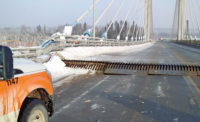Canada's National Energy Board released its final audit report on Trans- Canada's pipeline management system on April 24. NEB found the company to be in non-compliance with risk-assessment and hazard-identification regulations, monitoring and maintenance protocols, internal audits, inspections and management review.
The setback to TransCanada's effort to secure approval to build a major new pipeline segment came less than a week after the U.S. State Dept. delayed, until after the November elections, its decision on construction permitting for the last leg of the Keystone XL system.
Construction trades and contractors were vexed, with about $5.4 billion in work at risk. But NEB's audit and U.S. Pipeline and Hazardous Material Safety Administration (PHMSA) records show construction problems throughout the supply chain, particularly in engineering and welding.
Most trouble spots concern welding and other construction inspections, says former TransCanada engineer Evan Vokes. PHMSA inspection reports from Keystone XL Gulf Coast—obtained by the Tar Sands Blockade Organization (TSBO) through a Freedom of Information Act request and shared with ENR—show an overall weld rejection rate of just over 12%. TSBO says that measurement is "un- acceptably high for any pipeline."
It's up to contractors to vet owners' specs and instructions against codes and regulations, says Warren Fraleigh, president of the Alberta Building and Trades Council. "We only provide contractors with the skilled personnel necessary to complete those jobs," he says.
The problem isn't the skilled personnel from the trades, Vokes says. Projects are successful "when you enable the trades to do their job, [but] nobody is taking accountability for engineering decisions," he says. "TransCanada cannot let its contractors self-inspect."
NEB found that TransCanada's required third-party inspection program was "non-compliant."
Davis Sheremeta, spokesman for TransCanada, counters, "With PHMSA, we voluntarily agreed to 57 safety conditions for the Gulf Coast and Keystone XL projects that have set a new bar for safety and the design for modern oil pipelines. … No other pipeline has all of these safety and operating conditions, including higher construction standards."
Sheremata says TransCanada's Keystone XL Gulf Coast investigative digs after inspections revealed dents that occurred during construction. Segments were replaced before product was introduced into the system. "Our construction-quality programs work," he says.


Post a comment to this article
Report Abusive Comment